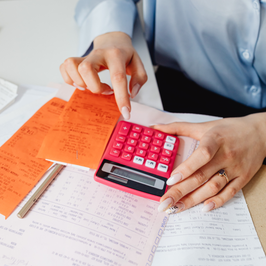What Happens in A Recession?

Recessions can impact almost every part of our daily lives, but if you have your finances in order, you may be able to weather the storm. These tips can help you understand your options and get prepared.
What is a recession?
It’s not as clear-cut as you might think — the exact definition of a recession can vary, depending on who you ask.
The conventional explanation is that a recession happens when real GDP (or “gross domestic product”) falls for two consecutive quarters. According to the Bureau of Economic Activity (BEA), real GDP measures the overall level of a country’s economic activity.
But, like most things in economics, the definition is up for debate. And some economists say that two quarters of falling real GDP doesn't, in fact, reflect a recession. Instead, they believe the National Bureau of Economic Research determines when the economy enters a recession.
The committee defines a recession as "a significant decline in economic activity that is spread across the economy and that lasts more than a few months." Their detailed scorecard for assessing those conditions includes the depth, diffusion, and duration of the downturn.
The NBER usually won't call a recession until months after one starts. You could feel the effects well before the committee chimes in.
What happens in a recession?
Most economists can find common ground on what happens when the economy enters a recession.
1. Unemployment rates rise
Companies often wrestle with weak demand, lower profits, and higher costs during recessions. Many will take drastic actions. Some cut travel expenses, others may stop hiring, and some may lay off employees.
In the last two recessions, the 2008 Great Recession and the 2020 pandemic, the economy saw unemployment rates hit double digits. For context, the average unemployment rate in a healthy economy hovers between 3% and 5%.
2. Housing prices decrease
Falling housing prices are often a byproduct of a recession. Across the past handful of downturns, the average house price dipped 5%.
There are several reasons why this could happen. For one, most banks and lenders are less likely to grant home loans as they were before the recession. There's also a supply and demand component. As the economy enters a downturn, many people will pull back on big-ticket purchases like a house or a car. And when supply exceeds demand, prices tend to fall.
3. Consumer spending plummets
Recessions and non-essential spending often don't mix. When economic conditions deteriorate, many people take a more cautious approach to where and how they spend. That could mean dining out less, skipping vacations, and spending less on clothes and other discretionary items.
4. Stock market dips
Market dips go hand-in-hand with economic recessions.
For example, as the world wrestled with the early days of the pandemic, major US indices (such as the S&P 500) fell as much as 33% in a month. At the same time, everyday people lost jobs, companies saw demand fall, and most everything appeared uncertain.
It would take a few months before the economy "officially" entered a recession. By that point, the market had started to show signs of life. So while market dips and economic recessions often coincide, we may feel the effects at different times.
5. The Fed takes action
As all this is happening, the economy typically sees two key indicators turn sideways:
-
Inflation decreases due to falling housing prices and consumer spending
-
Unemployment rises as businesses find ways to cut back
The Federal Reserve may step in. The Fed will usually deploy various monetary policy tools to try to help normalize these two bellwethers of the economy. Some examples of these tools are lowering interest rates or purchasing more bonds to add money to the market.
4 tips to prepare for a recession
Recessions are unavoidable parts of the economy, but there are things you can do beforehand to help prepare yourself and your finances.
1. Budget using the 50/30/20 rule
A good place to start is with a budget. Budgets are tools for keeping track of your monthly income and expenses — they can be helpful in both good and bad times! Your budget can show you how much you can save, spend, and invest, given your income and essential expenses.
There are a lots of different ways you can budget, but one common strategy is the 50/30/20 Rule. Each bucket represents how much money you should use towards needs, wants, and saving and investing. So 50% of your income goes to necessities like housing and groceries, 30% to wants like a vacation or clothes, and 20% to saving and investing for your goals.
2. Create an emergency fund
An emergency fund is a savings account you can tap into when a recession or other emergency or unforeseen event happens. One rule of thumb suggests saving 3 to 6 months of your living expenses for these types of events. That way, when they happen, you aren't worried about paying your rent and have some time to figure out your next steps.
To build an emergency fund, you need a bank account and the motivation to save each month. The Acorns Emergency Fund can make it easy to set aside money.
3. Tackle your debt
Consider paying down some debt if you have some wiggle room in your budget. Check out these 9 tips to pay off debt to help you get started.
4. If you can, keep investing for the long-term
Recessions are painful, but if history has taught us anything, it’s that they eventually pass. So as a general rule, don't sacrifice your long-term financial goals or investment strategy unless you absolutely have to.
And if you can, consider taking advantage of the potential market "discounts" that a recession yields. Economic recessions and market downturns have often been the best opportunities to grow your oak for the long term.
The views expressed are generalized and may not be appropriate for all investors. Investing involves risk, including the loss of principal. Acorns is not a bank. Banking services are issued by Lincoln Savings Bank or nbkc bank, members FDIC.
Carefully consider your financial situation, including investment objective, time horizon, risk tolerance, and fees prior to making any investment decisions.








